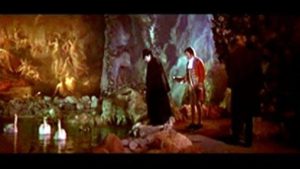Wagner’s written salutations to Ludwig characteristically read “my most beautiful, supreme, and only consolation,” “most merciful font of grace,” “my adored and angelic friend.” The notoriously florid effusions of these letters were both sincere and consciously hyperbolic. Looking back, Wagner would say to Bulow: “Oh, those don’t sound very good, but it wasn’t I who set the tone” [July 10, 1878]. For his part, Ludwig (whose own letters indeed “set the tone”) supported Wagner faithfully, but not without discrimination or reservation. Meanwhile Bulow was installed as conductor in Munich, and there led the premieres of Tristan und Isolde (1865) and Die Meistersinger (1868). . . .
In the midst of [the never-ending subterfuge concealing the Wagner/Cosima/von Bulow menage], Wagner whispers to Bulow: “Though we berate the ‘fool,’ he nonetheless belongs to us, and will never be able to break free of us. All we need now is a little patience. If we can obtain from him all that he has promised me – intelligible to my innermost self –, just think what an unprecedented and unhoped-for miracle that will be!” (April 8, 1866). Wagner had earlier written to Bulow: “There is something god-like about him . . . He is my genius incarnate whom I see beside me and whom I can love” (June 1, 1864). And this was by no means Wagner’s only such expression of a platonic love liaison with the king.
The relationship was further complicated by promises unkept or kept incompletely. Wagner underestimated his financial needs. He changed his mind about assigning his operas to a new Munich festival theater. But it must be said that the 562,914 marks Wagner received from Ludwig over a period of nineteen years was substantially less than what Meyerbeer received for 100 performances of Le Prophete in Berlin. As for choosing Bayreuth over Ludwig’s Munich – Wagner was surely correct to situate his Festspielhaus offsite. . . .
Ludwig got his way with Das Rheingold and Die Walkure both, premiered in Munich in 1869 and 1870. In 1876 he travelled to Bayreuth, twice, to twice attend the complete Ring of the Nibelung. In the aftermath of this first Bayreuth Festival, Wagner’s efforts to cope with the deficit in concert with Ludwig are exhausting merely to read about. He was simultaneously composing Parsifal, premiered at Bayreuth in 1882 under Ludwig’s court conductor Hermann Levi. Ludwig could not countenance attending a public performance of the sacred play; in 1884, a year after Wagner’s death, the Bayreuth production was mounted for the king, and the king alone, in Munich.
These early installments of the Bayreuth Festival, so instantly historic, vindicating Wagner’s genius to the world, were also a vindication of Ludwig, without whose patronage they could never have occurred. Ultimately, the king and his composer served one another royally. Every other factor bearing on their friendship of two decades shrinks to insignificance.


Leave a Reply